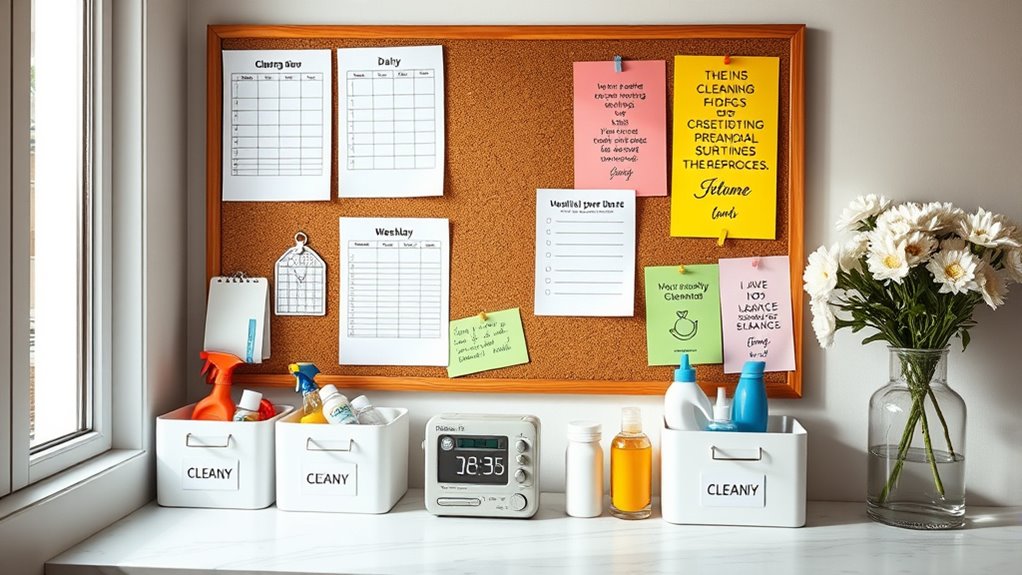To build a cleaning schedule you’ll actually follow, start by evaluating your home and listing what needs regular attention, then categorize tasks by daily, weekly, or monthly frequency. Keep it simple, set realistic times, and incorporate routines into your day, like quick tidies or longer sessions on weekends. Use reminders and place your schedule where you’ll see it often. If you keep adjusting and stay consistent, you’ll find it easier to maintain a clean home—discover how to customize your plan for success below.
Key Takeaways
- Assess your home and categorize cleaning tasks by daily, weekly, monthly, and seasonal needs.
- Set realistic, specific times for cleaning to turn routines into habits.
- Break large tasks into smaller, manageable steps to prevent feeling overwhelmed.
- Write down your schedule and use reminders to stay accountable.
- Regularly review and adjust your plan to suit changing schedules and maintain consistency.

Creating a cleaning schedule helps you stay organized and keeps your home tidy without feeling overwhelmed. When you have a plan, you avoid the chaos of last-minute cleaning and ensure every area gets attention regularly. The key is to design a schedule that fits your lifestyle, so it feels manageable rather than burdensome. Start by evaluating your home and listing the tasks that need regular attention. Think about daily chores like washing dishes and wiping counters, weekly tasks such as vacuuming and bathroom cleaning, and monthly or seasonal chores like cleaning windows or deep-cleaning carpets. Once you know what needs to be done and how often, you can prioritize and allocate time slots for each task.
Design a personalized cleaning schedule to stay organized and maintain a tidy home effortlessly.
Next, consider your daily routine and identify the best times to tackle cleaning tasks. Do you prefer to clean in the morning, afternoon, or evening? Setting specific times helps turn cleaning into a habit rather than an afterthought. For instance, you might dedicate 10 minutes each morning to quick tidying, like making beds and clearing clutter, and reserve longer sessions on weekends for more intensive cleaning. Be realistic about your schedule; if you know you’re busy during weekdays, plan to do lighter cleaning then and save more involved chores for days when you have extra time.
To keep yourself accountable, write down your schedule and stick it somewhere visible, like on the fridge or a bathroom mirror. Use reminders on your phone if needed, so cleaning tasks don’t slip through the cracks. Break larger tasks into smaller, manageable steps to avoid feeling overwhelmed. Instead of thinking about cleaning the entire bathroom, focus on one task each day—like cleaning the sink one day and scrubbing the toilet another. This approach makes cleaning less intimidating and more consistent.
Flexibility is essential. Life can be unpredictable, so don’t get discouraged if you miss a scheduled task. Adjust your schedule as needed, and don’t be afraid to shift tasks around to better fit your current circumstances. Over time, you’ll discover what works best for you, and your schedule will become a natural part of your routine. Remember, the goal isn’t perfection but consistency. Building a cleaning schedule that you actually follow means creating a plan that’s tailored to your lifestyle, easy to stick with, and adaptable. When you do this, maintaining a clean home becomes less stressful and more sustainable. Incorporating regular assessment and rotation of tasks can help prevent clutter buildup and keep your environment fresh and organized.
Frequently Asked Questions
How Often Should I Deep Clean Different Areas?
You should deep clean different areas every 1 to 3 months. For high-traffic spots like the kitchen and bathroom, aim for once a month. Less-used spaces, such as guest rooms or storage areas, can be deep cleaned every three months. Regular deep cleaning prevents buildup of dirt and germs, making maintenance easier. Adjust the frequency based on your household’s needs and lifestyle to keep your home fresh and healthy.
What Tools Are Essential for an Effective Cleaning Schedule?
You’ll need a trusty vacuum, microfiber cloths, all-purpose cleaner, scrub brushes, and a mop—basically, your cleaning superhero squad. Ironically, the most essential tools are often overlooked, like a squeegee or microfiber cloths that make your job easier. Keep a caddy with everything handy, so you’re not chasing tools mid-clean. With these essentials, your cleaning schedule becomes less of a chore and more of a victorious routine.
How Can I Stay Motivated to Stick to My Schedule?
To stay motivated, remind yourself of the benefits, like a cleaner space and less stress. Set small, achievable goals and reward yourself when you reach them. Keep your schedule flexible enough to adapt when needed, and track your progress to see your improvements. Enlist a friend or family member for accountability, and focus on the positive feelings that come from a tidy, organized home.
Should I Involve Family Members or Roommates?
Absolutely, involving family members or roommates turns the chore chart into a team effort rather than a solo battle. You become the captain steering a shared ship, making cleaning feel less like a burden and more like a group adventure. When everyone pitches in, it’s easier to stay motivated and the workload feels lighter. Plus, you all share the pride of a sparkling home, creating a harmonious space for everyone to enjoy.
How Do I Modify My Schedule for Busy Weeks?
When your week gets busy, adjust your cleaning schedule by prioritizing essentials and reducing tasks. Break chores into smaller, manageable chunks and spread them out over the week. Be flexible—skip or reschedule non-urgent tasks without guilt. Use quick cleaning hacks to save time, like wiping surfaces daily instead of deep cleaning. Remember, it’s okay to modify your plan; staying consistent with manageable tasks keeps your space tidy even during hectic weeks.
Conclusion
By creating a cleaning schedule tailored to your routine, you turn chaos into harmony, like a symphony where every instrument knows its part. Stick to it consistently, and cleaning will become less of a chore and more of a habit you genuinely enjoy. Remember, the key is flexibility and commitment—think of your schedule as a trusted map guiding you through a clutter-free life. Stay dedicated, and soon, cleanliness will feel as natural as breathing.









